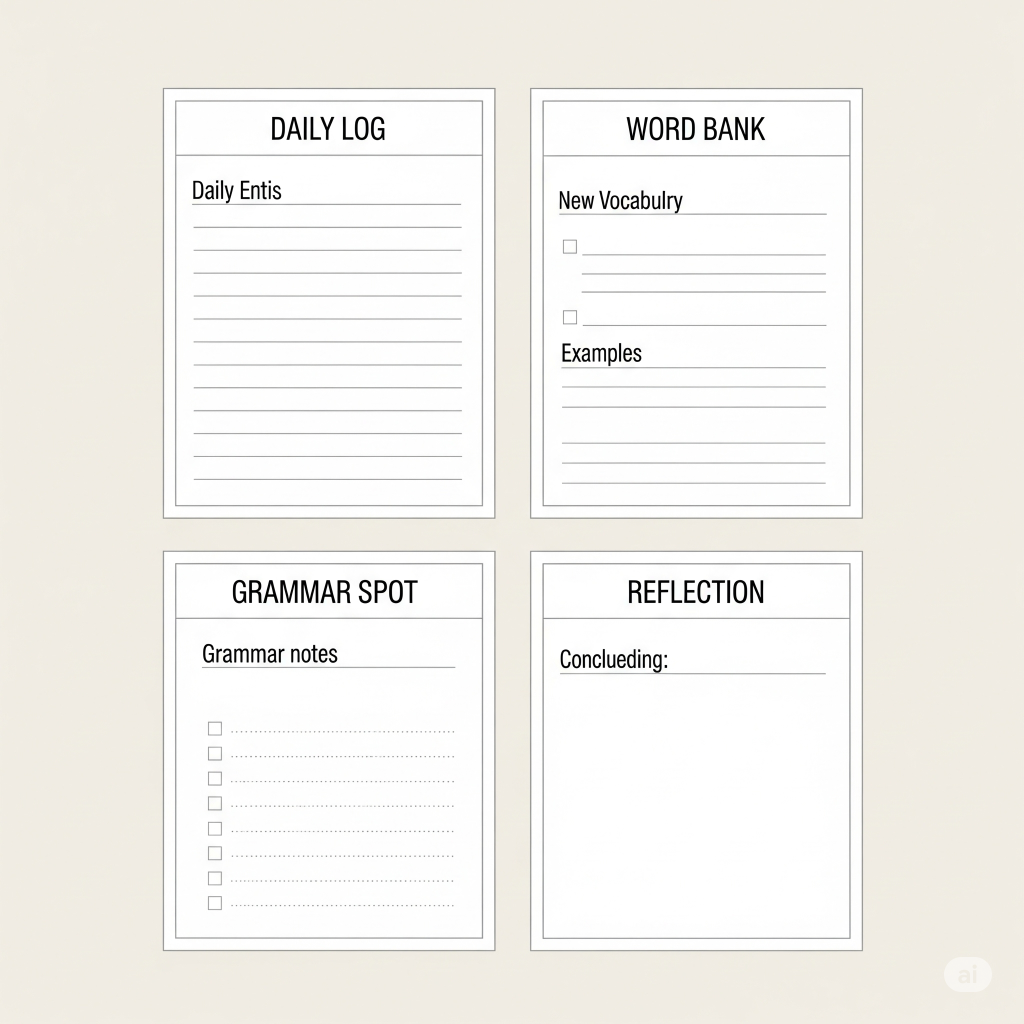The Problem Nobody Talks About
Here’s the ugly truth: most people start learning a new language with fireworks and end it with tumbleweeds. You download Duolingo, buy a notebook, maybe even watch a few YouTube videos. Then—boom—you forget the notebook under your bed and stop opening the app after day 12.

Sound familiar? Thought so.
The real issue isn’t that you’re lazy. It’s that your brain loves proof of progress. Without seeing what you’ve actually achieved, motivation leaks away like water through a cracked bucket. That’s where the humble but mighty language journey comes in. It’s not glamorous, but it works—kind of like brushing your teeth.
Why a Language Journal Is Basically Free Therapy
It Shows You’re Not Stuck
Ever thought, “I’ve been learning for months, but I still suck”? That’s a lie your brain tells. If you log each little win—like finally using the simple present tense correctly—you’ll see that you’re actually moving forward.

It Kills the “I’ll Do It Tomorrow” Excuse
A journal is proof you showed up. You can’t fake entries. Writing down “learned 5 new phrasal verbs” is better than vaguely promising yourself you’ll study “later.”
It Helps Stuff Stick
Writing activates memory in a way typing or reading doesn’t. You’ll remember weird little details—like those false friends that trip you up—just because you put pen to paper (or finger to keyboard).
How to Start Without Making It Complicated
1. Pick Your Format
Notebook, app, scraps of paper—who cares. If you want fancy, go digital and pair it with a grammar checker or a paraphraser. If you want analog, grab a pen and stop stalling.
2. Don’t Set Stupid Goals
No, you’re not going to be fluent by summer. Instead, try goals like:
- “Use the passive voice in five sentences this week.”
- “Learn 20 words and actually write them in context.”
3. Structure Your Entries

Otherwise, you’ll just doodle and call it learning. Try:
- Daily Log: Write 3–4 lines about your day.
- Word Bank: New words, idioms, or tricky phrasal verbs.
- Grammar Spot: Where you break down stuff like modal verbs or reported speech.
- Reflection: A short rant about what’s working, what’s not.
Tips So You Don’t Quit (Again)
- Keep entries short. Nobody’s grading you.
- Use prompts. Example: “Today I learned the word ___” or “I confused X with Y but fixed it.”
- Mix it with practice. Tried shadowing? Write down which parts felt natural and which sounded like broken karaoke.
- Make it fun. Add doodles, stickers, or dumb inside jokes. The sillier, the stickier.
Why This Builds Discipline
A journal isn’t about writing—it’s about showing up. Even two sentences a day proves you’re consistent. And that consistency is what gets you past the intermediate plateau, where most learners drop out.
Months later, when you flip back and read your awkward beginner entries, you’ll laugh. And then you’ll realize you’re actually fluent enough to laugh in your target language.
Real People, Real Wins
- A beginner started with “I eat bread.” Six months later, they journaled about politics.
- An intermediate learner used their journal to master intonation, by mimicking TV dialogue and then reflecting on it.
- An advanced student rewrote whole conversations into reported speech for practice. Nerdy? Yes. Effective? Also yes.
Okay, Now Actually Start
Don’t just read this and move on. Write your first entry now:
“Today I learned how to say ‘I’m tired’ in French. I am tired.”
Boom. You’re officially journaling. Keep it going.
FAQs (Because You’ll Ask Anyway)
1. How long does journaling take?
5–10 minutes. You waste more time scrolling.
2. Do I need to write entirely in the target language?
No. Mix both languages. Reflect in your own, practice in the other.
3. Is digital journaling worse than notebooks?
No. Digital makes it easier to combine with tools like a grammar checker.
4. What if I don’t know many words?
Use simple sentences. Even “I like pizza” counts.
5. How often should I update it?
Daily if you can. But even 3x a week builds habits.
